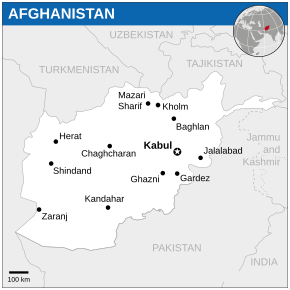More languages
More actions
| Islamic Emirate of Afghanistan د افغانستان اسلامي امارت | |
|---|---|
 | |
| Capital and largest city | Kabul |
| Official languages | Pashto Dari |
| Demonym(s) | Afghan |
| Dominant mode of production | Capitalism (semi-feudal) |
| Government | Islamic Emirate |
• Amir al-Mu'minin | Hibatullah Akhundzada |
| Area | |
• Total | 652,867 km² |
| Population | |
• 2023 estimate | 41,128,771 |
| GDP (PPP) | 2020 estimate |
• Total | USD $81.007 billion |
• Per capita | USD $2,459 |
The Islamic Emirate of Afghanistan (د افغانستان اسلامي جمهوریت), also known as Afghanistan (افغانستان), is a landlocked country in Central Asia. It borders Pakistan to the southeast, Iran to the west, Turkmenistan, Uzbekistan and Tajikistan to the north, and China to the northeast.
Currently active communist parties in the country include the Communist (Maoist) Party of Afghanistan.
History
British invasion
The United Kingdom invaded Afghanistan for a third time in 1919, leading Soviet Russia to establish the first diplomatic relations with Afghanistan and recognize its borders. When the British tried to assassinate Afghan leader Amanullah Khan in 1920, the RSFSR and Afghanistan signed a non-aggression pact.[1]
Democratic Republic and civil war
In 1978, the Democratic Republic of Afghanistan was formed.
After a long war between the DRA and the Mujahideen, armed and funded by the USA, the government was lost to the Mujahideen terrorist organization in 1992.
In 1994, a group of students in Kandahar founded the Taliban, which managed to overthrow the USA puppet Mujahideen government by 1996.
U.S. invasion
See main article: War in Afghanistan
In 2001, after Mujahideen members carried out the 9/11 attacks in New York, the USA invaded Afghanistan to support the Mujahideen, telling the Statesian public that the Taliban were the real perpetrators. From 2002 to 2021 the Mujahideen had control of most of the country and was the officially recognized government by most countries.
In 2011, journalist Julian Assange claimed that "The goal is an endless war, not a successful war" to enrich the "transnational security elite"[2]
According to WikiLeaks, the CIA sought to sway public sentiment in favor of the Afghan war by promoting stories of how the US occupation is 'good for women'.[3][4]
During the occupation, the US extensively polluted the country with chemicals like perchlorate, PFAS, and RDX. These chemicals came both from the use of military equipment in Afghanistan - perchlorate is used in rocket and missile fuel, for example - and also from the sewage and waste of US military bases. These pollutants have caused skin rashes, organ problems, cancer, and harmed mental development of children. In 2022, US President Joe Biden only expressed concern about the impact these chemicals had on US troops, and not Afghanistan's civilians.[5]
In 2021, after US president Biden announced a full troop withdrawal from Afghanistan[6], the Taliban retook the entirety of Afghanistan with little to no fighting.[7] This move has been described as a strategic repositioning by the US, likely to seek to destabilize the Chinese and Russian efforts to develop the Shanghai Cooperation Organization.[8] Former Prime Minister of the imperialist UK Tony Blair called the US withdrawal from Afghanistan "imbecilic" and criticized the slogan "forever wars", illustrating the UK's support for continued imperialist activity in Afghanistan.[9]
Post-occupation
On August 26, 2021, there was a suicide bombing at the Kabul airport. It's likely that this attack was carried out with either tacit approval or explicit involvement of US proxies, given that the threat of the attack was known beforehand. It is also a potentially convenient excuse for imperialist militaries to remain in Afghanistan, despite the Taliban demand to withdraw by 31 August.[10]
The Taliban administration continue to fight an armed struggle against Islamic State - Khorasan Province, a group aligned with ISIL.
The US sanctions are currently driving Afghanistan to famine.[11]
References
- ↑ "The October Revolution and the east" (2018-04-21). Proletarian. Archived from the original on 2022-05-17. Retrieved 2022-12-27.
- ↑ Wikileaks on Twitter: Julian Assange speaking in 2011: "The goal is to use Afghanistan to wash money out of the tax bases of the US and Europe through Afghanistan and back into the hands of a transnational security elite. The goal is an endless war, not a successful war" #Afghanistan
- ↑ LIVE: Wikileaks Exposes CIA Woke Imperialism Propaganda In Afghanistan by Jackson Hinkle on Rokfin
- ↑ CIA Document Calls For Using Afghan Women as Messengers to Humanize the War by Lucinda Marshall on Common Dreams
- ↑ Lynzy Billing (2023-09-25). "America’s War in Afghanistan Devastated the Country’s Environment in Ways That May Never Be Cleaned Up" Inside Climate News. Archived from the original on 2023-09-26. Retrieved 2023-10-02.
- ↑ Biden Announces Full U.S. Troop Withdrawal From Afghanistan by Sept. 11
- ↑ The Fall of Kabul: Beginning of Taliban 2.0 by Financial Express
- ↑ Inside US Afghanistan pullout, CIA opium ratline, pipeline conflict, new cold war by The Grayzone with guest journalist Pepe Escobar
- ↑ War Criminal Tony Blair: Afghanistan Withdrawal "Imbecilic" | Richard Medhurst for RT
- ↑ Blast Rocks Kabul Airport by Richard Medhurst
- ↑ "How U.S. sanctions are driving Afghanistan to famine".


